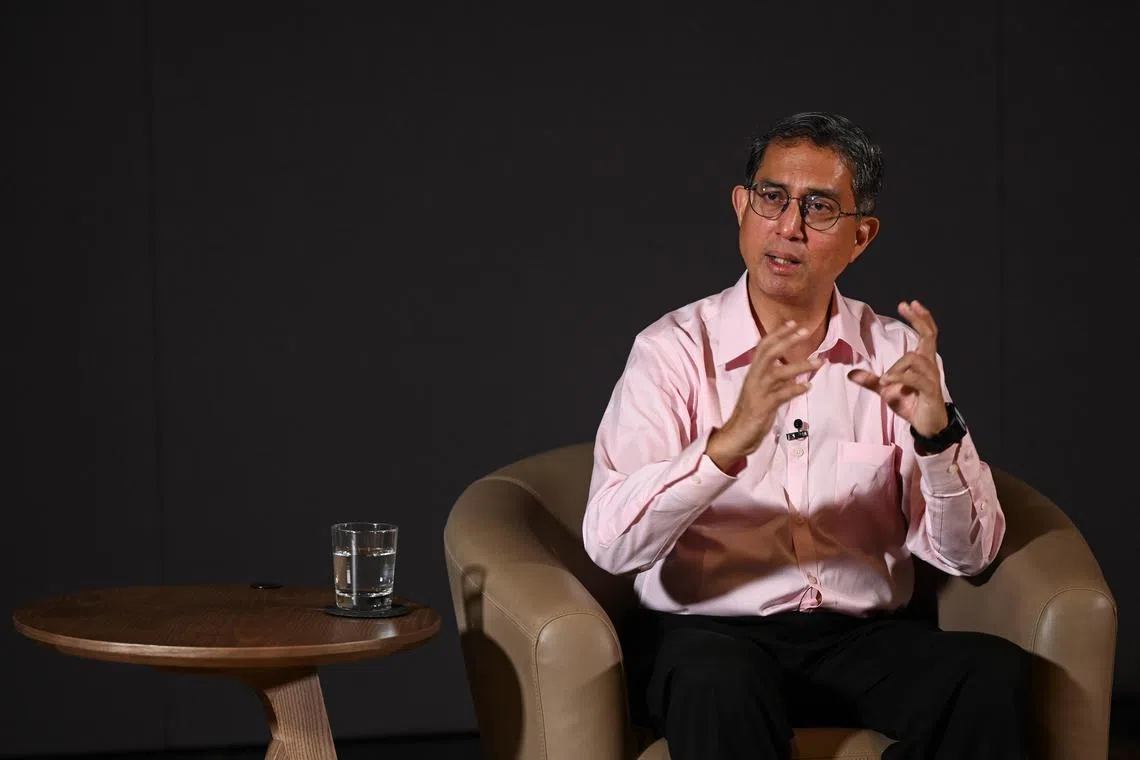New platform that includes more Malay/Muslim groups being developed: Faishal Ibrahim
Sign up now: Get ST's newsletters delivered to your inbox

100 Days In Office Sit-down Interview with Acting Minister-in-charge of Muslim Affairs, Associate Professor Faishal Ibrahim at Project Studio, Wisma Geylang Serai, on Aug 27,.
PHOTO: BERITA HARIAN
- A new framework is being formed to bring together established and newer Malay-Muslim groups, going beyond the existing M³ framework (Mendaki, Muis, Mesra) to better serve evolving community needs.
- Prof Faishal aims to create a broad platform to synergise resources and empower diverse groups like MudaSG, ensuring sustainable community benefits for future generations.
- The government closely monitors the Israel-Palestine situation, supporting a two-state solution, and ensuring Palestinians can grow and develop to their full potential.
AI generated
SINGAPORE - A refined framework bringing together the efforts of both established Malay/Muslim organisations and newer groups is being formed, said Acting Minister-in-charge of Muslim Affairs Faishal Ibrahim.
This initiative will go beyond the existing M³ framework that supports the Malay/Muslim community, he said, referring to the partnership between self-help group Mendaki, the Islamic Religious Council of Singapore (Muis) and the People’s Association Malay Activity Executive Committees Council (Mesra). M³ was formed in 2018.
The change comes as the needs of the Malay/Muslim community have evolved, as have engagement methods and the types of community groups in Singapore today, said Associate Professor Faishal in an Aug 27 interview to mark his 100 days in office, on Aug 31.
He said that in ground engagements he has done since being put in charge of Muslim affairs in May, community groups have expressed “very strong aspirations” to partner with him.
They include Malay/Muslim and Indian Muslim organisations – some of which have been around for decades, even predating Singapore’s independence – as well as newer ones and informal groups, he said.
“This is where I would like to develop a platform, at the broad level, to galvanise not only the synergy, but also the resources that we have... in developing the Malay/Muslim community,” he said.
While in the past Muis, Mendaki, Mesra and established Malay/Muslim organisations would focus on certain core areas of work, new groups have come up outside of this ecosystem to improve lives, which has changed the landscape, he noted.
“So working or developing things based on the past may not work for this new landscape,” said Prof Faishal, who is also Senior Minister of State for Home Affairs.
He cited MudaSG, a non-profit established in 2021 which aims to empower younger Malay/Muslims.
“It has developed within its own context, and is able to contribute positively to the Malay/Muslim community, especially in the youth space,” he said.
Integrating these groups would empower them to better contribute to the people they work with, he said.
On the timeline for implementing the refreshed framework – part of his shared vision for the Malay/Muslim community – Prof Faishal said he does not intend to rush into a decision, given that it will affect many lives.
“I want to listen to as many people as possible, so that whatever we develop will be something that not only will bring goodness to the community and be effective, but also is sustainable,” he said.
“Because we are not doing this for just one year, two years, five years – I want this to be able to serve and benefit the future generations.”
During the interview at community hub Wisma Geylang Serai, where he serves as lead adviser, Prof Faishal also shared other feedback from the community.
Among the suggestions raised were for additional prayer spaces.
Prof Faishal said he has been looking at whether development works on new mosques – such as the upcoming ones in Tengah and Tampines North – can be expedited, and will provide regular updates on these projects.
Meanwhile, as other mosques – such as Darussalam in Clementi
He also pointed to measures such as holding a second session for Friday prayers, first introduced as a safe management measure during the Covid-19 pandemic, which some mosques here have adopted to increase their capacity.
On the current M³ framework, Prof Faishal said the new Malay/Muslim political office-holders will helm some of its focus areas, which include supporting vulnerable individuals and families as well as employment and employability.
The new office-holders include Mr Zhulkarnain Abdul Rahim, who will become Minister of State for Foreign Affairs and Social and Family Development in 2026, and Dr Syed Harun Alhabsyi, who will be appointed Senior Parliamentary Secretary for Education and National Development in October.
Mr Zhulkarnain will take over the focus area supporting Malay/Muslim families in marriage, parenting and early childhood development, which were previously handled by Prof Faishal. He will also helm the Malay Language Council, including overseeing the Bulan Bahasa (Malay Language Month) event.
Dr Syed Harun will oversee the youth focus area together with Minister of State for Health and Digital Development and Information Rahayu Mahzam, and will work together with Prof Faishal on Project Dian, a programme supporting Malay/Muslim families living in rental flats.
Meanwhile, Dr Wan Rizal Wan Zakariah – who recently joined the National Trades Union Congress Employment and Employability Institute – will join Senior Minister of State for Defence Zaqy Mohamad in helming the employment and employability focus area.
While Minister for Social and Family Development Masagos Zulkifli will not play a role in M³ moving forward, Prof Faishal said he continues to receive advice from his predecessor, who was minister-in-charge of Muslim affairs between 2018 and 2025.
On the issue of Israel-Palestine, Prof Faishal was asked whether the Government would consider reviewing its foreign policy position amid the deteriorating conditions in Gaza, as well as the expansion of settlements in the occupied West Bank.
Prof Faishal said he wanted to assure Singaporeans, including the Malay/Muslim community, that the Government was looking at this issue very closely.
He added that he has been in direct contact with Prime Minister Lawrence Wong on this matter since taking on the Muslim Affairs portfolio, and that he will continue to bring up the concerns and feelings of Singaporeans to the Government.
He reiterated the Government’s support for a negotiated two-state solution, and that this has been a consistent position for decades.
“We want peace... We continue to push for this,” he said. “And we want to make sure that the Palestinians also have lives of their own, and have the opportunity to grow and develop themselves to their maximum potential.”



